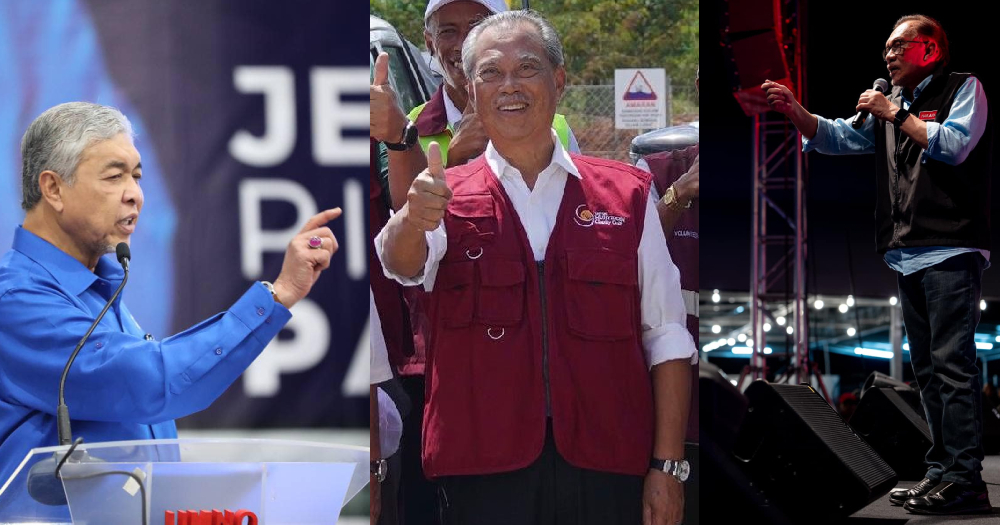Follow us on Telegram for the latest updates: https://t.me/mothershipsg
Mothership recently spoke to Tharma Pillai, advocacy director of the Undi18 NGO dedicated to lowering Malaysia’s voting age, about the campaign to allow 18-year-old citizens to vote.
But what does this mean for Malaysia’s upcoming general election?
Millions of new voters
The election, colloquially known as GE15, will see Malaysia’s electorate expand with the inclusion of millions of new voters.
This number includes those who turned 18 in the past four years, as well as those who were under the age of 21 in 2018.
These young voters come to political maturity in the aftermath of a chaotic four years, of pandemics and politicking.
They have seen three governments, first led by Pakatan Harapan, then the Bersatu-led Perikatan Nasional, and then the Barisan Nasional-dominated group, each take their turn leading governments.
They will now have to choose between them.
But what impact will they have? Especially as several opinion pieces in Malaysian and Singaporean media have described the youth voter in Malaysia as “apathetic”.
Tharma set out two positions: firstly that the influx of youth voters has already had an impact both on policy as well as candidate choice for the main parties. Secondly, that young voters were not apathetic, merely undecided.
Sudden impact
Tharma said that political parties were already very aware just how large the new bloc of voters were, and adapted policy positions in anticipation of appealing to them.
One example given was the emergence of green or climate-focused policy. Aimed at addressing the impacts of climate change, as well as attempting to hit net zero carbon emissions targets, the issue was present in both the proposed 2023 budget, released by BN in October, and PH in their November manifesto.
A report by Lee Hwok Aun for ISEAS noted that the three main coalitions all share policy proposals that would be attractive for a youth voter, not just in climate, but in education, welfare, and healthcare.
Changing attitudes to welfare
Tharma said that the parties' changed attitude to welfare can be attributed to the lowered voting age. With more youth hailing from urban areas, the traditional welfare in the form of cash handouts are no longer enough to provide significant assistance.
He said youth voters are now looking for more structural approaches to welfare, something that is reflected in the major coalitions’ policy proposals.
It is also reflected in the demographics of new candidates, which has skewed younger than before.
Although Undi 18 has yet to fully assess the age average of the candidate pool, Tharma noted that veteran politicians were being displaced in favour of younger candidates, which he attributed to an attempt to appeal to younger voters.
However, in the case of coalitions like BN, there are alternative conjectures.
There is also the emergence of youth centric parties such as Syed Saddiq’s MUDA, competing under the PH banner.
The Unforgiven
Tharma Pillai also took pains to dispute the characterisation of Malaysian youth as apathetic.
Saying that apathy implied that Malaysian youth did not care, he countered by saying survey data seen by him showed they were in fact engaged with the issues and indicated they an expressed interest in voting.
However Malaysian youth were undecided about which party to support. This was not just because they were disengaged with the political process, but also due to the chaotic nature of Malaysian politics in recent times.
These young people had come to political maturity at a time where political manoeuvring had decided the fate of three successive governments in a very short amount of time.
This led to a sense of betrayal, as well as political uncertainty; and Tharma said this showed a need for better laws and mechanisms to address such unethical behaviour.
Any which way you can
When asked about how he thought the election might turn out, Tharma declined to make a prediction.
He said he thought the three major coalitions were well funded and well prepared for the contest, and there were ultimately too many variables to consider.
But he had a message for young Malaysian voters, to go out and have their voices heard by voting, and to ultimately make a choice.
He also said that for the moment, the biggest issue in Malaysian politics was corruption.
And if youth voters had to pick a single issue to decide their vote, he felt that it should be “the agenda of address and solving corruption”.
Related Stories
Top image by Zahid Hamidi/Facebook, Muhyiddin Yassin/Facebook, and Anwar Ibrahim/Facebook
If you like what you read, follow us on Facebook, Instagram, Twitter and Telegram to get the latest updates.
